#amelek
Text

Woith every p-p-p-penny
#amelek#amalekite#Jewish#judean#Israelite#isreal#Jews#who framed roger rabbit#wfrr#roger rabbit#toon#meme#toonblr
9 notes
·
View notes
Text
Israel won’t stop at Palestinians. They intend to kill us ALL!
We are all AMELEK...
6 notes
·
View notes
Text

youtube
https://youtu.be/qSOrXPjXlEs
PREMIERING @12am EST
Amelek's schemes to DECEIVE the elect of GOD shall NOT Prevail! Tune into EXPOSING FAKE JEW INFILTRATION OF PAPAU NEW GUINEA as the leadership unpacks the deceptions being taught to our people scattered among the Isles of the Sea!!!
🔥🔥🔥🔥🔥🔥🔥
🌏IUIC DIASPORA 🌏
1 note
·
View note
Text
"But this is a strange commandment," he went on. "How can we both 'erase his memory' and 'not forget'? And why should the commandment apply specifically 'in the land that the Lord thy God gives thee for an inheritance'? 7.3.2023
𝗧𝗵𝗲 𝗱𝗶𝘀𝗽𝗼𝘀𝘀𝗲𝘀𝘀𝗲𝗱
𝗚𝗲𝗿𝘀𝗵𝗼𝗺 𝗚𝗼𝗿𝗲𝗻𝗯𝗲𝗿𝗴
(𝙾𝚛𝚒𝚐𝚒𝚗𝚊𝚕𝚕𝚢 𝚙𝚞𝚋𝚕𝚒𝚜𝚑𝚎𝚍: 𝚃𝚑𝚎 𝙹𝚎𝚛𝚞𝚜𝚊𝚕𝚎𝚖 𝚁𝚎𝚙𝚘𝚛𝚝, 𝙼𝚊𝚛𝚌𝚑 𝟷𝟸, 𝟷𝟿𝟿𝟸)
Around the time of the Lebanon War, I had a rented room in the elegant old Jerusalem neighborhood of Rehaviah, and often found an empty seat at an ornate, comfortable synagogue where the regulars included cabinet ministers, top officials and their soon-to-be-Knesset-member sons. Each Friday night a different congregant gave a short talk on the week's portion. On the Sabbath before Purim, I dreaded the sermon. The Book of Esther says Haman was the descendant of Agag, king of the Amelekites; the special reading for that Sabbath recalls how Agag's ancestors ambushed the Israelites in the desert, and commands us to "erase the memory of Amalek." Given the shul and the mood of the day, I feared a tirade identifying Amalek with a present-day enemy, and drawing ugly conclusions. I didn't recognize the thin, balding figure who rose for the sermon. But as I expected, he roared: "The Torah demands of us, 'Erase the memory of Amalek from under heaven; thou shalt not forget!'" I sighed.
"But this is a strange commandment," he went on. "How can we both 'erase his memory' and 'not forget'? And why should the commandment apply specifically 'in the land that the Lord thy God gives thee for an inheritance'?
"To understand, we have to look at how Amelek came into the world. Who was the original Amelek, the founder of the nation?
"In Genesis 36, we learn Amalek was the son of Eliphaz, the son of Esau -- the man who was dispossessed of his birthright and robbed of his paternal blessing by our father Jacob.
"The midrash, in Bereshit Rabba, reveals the price paid for Esau's hurt and resentment. When Esau learned he had lost the blessing, says the Torah, 'He cried with a great and exceedingly bitter cry.' The midrash cites the one other verse in the Bible where those words repeat: Mordechai responds with just such a cry to the decree against Jacob's children -- by Haman the Amalekite."
I leaned forward. This wasn't what I'd expected.
"But Amalek inherited resentment from his mother as well," he said. "The Gemara says in tractate Sanhedrin: 'Timna was a daughter of kings... she sought to convert. She came to Abraham, Isaac and Jacob, and they would not accept her. So she went and became the concubine of Eliphaz the son of Esau, saying: It is better to be a handmaid to this nation then a noblewoman elsewhere. From her came forth Amalek, who caused sorrow to Israel. Why? Because they need not have turned her away.'
"And be precise here: Timna was Eliphaz's concubine . We know the fate of a concubine's son -- to be a second-class child, not accepted by the sons of his father's wives, an outsider, with no place in the will, no inheritance."
The man at the podium bellowed: "Such was Amalek: the third generation of those we and others turned away, dispossessed, made outsiders -- the heir only to resentment and anger. That's hat created the bitter tribe that attacked us in the desert, when we were faint and weary.
"Therefore, to erase Amalek's memory, we must make certain not to recreate our worst enemy. For those whom we deny their birthright, those whom we discriminate against, leave out -- they become the new Amalek.
"When does our obligation fall on us most fully? When we are in our land, when he have received our own inheritance. And even here, we cannot simply 'erase the memory of Amalek' once and for all; we must guard ourselves eternally: 'Thou shalt not forget.'"
He slipped back into the pews. I wondered how the self-possessed, powerful men around me had understood his message.
After the service, I couldn't find the speaker in the crowd. I never saw him in that shul again.
--
איתי פלשר
מחנך בירושלים
0523528965
0 notes
Text
Shabbat Zachor: Amalekites, Egyptians, and a Promise
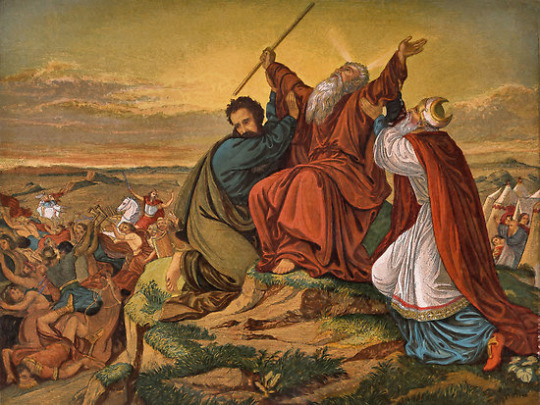
The Sinai Desert was still pitchy-black when Lt. Djer’s adjutant, Corporal Tem, shook his commander’s shoulder to awaken him. The lieutenant immediately arose—his training at the Royal Egyptian Army Military Academy (Heliopolis) stood him in good stead. He sat on the edge of his cot, blinking and collecting his thoughts.
Today, we pull patrol-duty in our Northwestern Sector, he thought, I must set a good example for my troops.
“It will be blasting-hot today in the wilderness, Sir,” whispered the corporal.
The lieutenant smiled ruefully. “It’s always hot in this furnace, Corporal,” he said, tersely. “Have the sergeant-major rouse the troops—quietly. We are on full combat alert, as befits us fortunate soldiers who guard the Blessed Boundaries of Holy Mother Egypt from any invaders or ravagers.”
The corporal nodded, saluted, and disappeared into the dark.
The lieutenant did his morning toilet, dressed in his cotton undergarment, and began buckling on his bronze body armor. Djer’s armor fitted a bit more snugly than usual. He had gained a few pounds on his last leave to his home village. His parents raised sweet dates, plums and figs on a little farm close to the Nile River. Pa’s sweet melons were legendary for their size, heft, and color, and he regularly won first-prize in the farmers’ market. Patting his belly, Djer left the tent to inhale the pure, sweet desert air, tinged by a salty breeze from the Sea of Reeds to the north.
“We await your orders, Sir,” came a voice from the shadows, which he recognized as that of Sergeant-Major Joser, his aide-de-camp in commanding 18th Regiment, Royal Egyptian Cavalry (“Jaws of Anubis”). “Will you be desirous of mounted chariots, Sir? It would not take but a half-hour to ready them for patrol and possible combat.”
Djer had thought about this the previous evening, and decided. “It will not do for the sake of maintaining mounted silence to take the chariots,” he replied, “on the chance that we encounter a desert tribe of Bedouin, and require a surprise attack. No, Sgt-Major; this day, our troopers will ride their mounts.”
“Very good, Sir,” said Sgt.-Major Joser, “I will have the troops ready their horses. All will prepare the saddles meant for warfare, not parade.”
“Do so,” commanded Lt. Djer.
Less than a hour later, the copper bugles sounded, and the 18th Regiment was under way.
“Which direction, Lieutenant?” asked the Sergeant-Major.
“Let us head towards the Sea of Reeds,” answered the lieutenant, “just to find any stragglers from that escaped mob of Israelite slaves. We are under orders to—deal with them.”
“Deal with them by what means, Lieutenant?” asked the Sergeant-Major. He was a grizzled veteran of many encounters with Egypt’s many enemies. An eye-patch gave evidence of the Old War with the Nubians.
“By any means necessary—including killing,” returned the lieutenant. I hate to think of murdering innocent women and children, even if they are Israelite, he thought. Still, we are under the orders of Capt. Sobek, who is in constant touch with the High Command at Royal Egyptian Army Headquarters. I have no choice.
The soldiers rode along in silence, whispering only when necessary. A blood-red sun was rising in the east. There was no sound, except the creaking of saddlery and the clank of lances against bronze armor.
“Sir,” said the Sergeant -Major, “We must halt, to allow Siptah, the Jebusite Scout, to study the trail and tell us what to expect.”
The lieutenant nodded. Siptah, agile and alert despite his advanced years—he was at least forty—practically vaulted over the head of his horse, and, lying on the ground, began sniffing eagerly, like a desert dog. Djer looked on in disgust—how could a human being, made in Osiris’s image, degrade himself into sniffing at the offal of passing animals? Still, he had to grant Siptah some credit—the scout was nearly always correct in his trail-judgment, and—besides an uncomfortable, earthy smell the scout had—Why can’t he wash more often? Djer would ask, holding his breath while he spoke with him—he was a pleasant enough fellow, and a great warrior, besides.
“What news, Scout?” he asked.
The elderly Jebusite grinned and rose, not bothering to dust the desert-sand off of his arms and legs. Arms akimbo, he stood before the lieutenant, not bothering to salute.
“If it please the Lieutenant, Your Worship—” began Siptah.
“Just Lieutenant will do, Siptah,” said Djer, fanning the air before his face. How can the poltroon live with himself? he thought, breathing through his mouth, “Give your report, please.”
“Israelites passed by—oh, perhaps one-two hours ago,” said Siptah.
“Good; we will shadow them, and make certain they are moving well out of Imperial Territory,” answered Lieutenant Djer.
Siptah raised one gnarly hand. “I have more to report, Lieutenant,” he said, and his grinning face grew grim, “There is also a war-party of Amalekites following the Israelites, perhaps just one-half hour behind.”
A voice from behind Djer called out gleefully, “What luck! Let the Amalekites finish what we ought to have done to those evil Israelites!”
Without turning, the lieutenant called out, “At ease, Corporal Henut! I called for silence in ranks!”
“Begging your pardon, Lieutenant,” returned Henut, “but I have more than a bone to pick with those abominable Israelites—they laid waste to my homeland, including my father’s little idol-shop! That Invisible God of theirs, jealous no doubt of my father’s stock-in-trade, caused it to be crushed beneath the weight of that insidious hailstorm. I hate those Israelites with every fibre of my being.”
Nodding at the Sergeant-Major, Djer ordered the detachment to halt.
“Military Police Detail!” ordered the lieutenant, “Apprehend Corporal Henut, and bring him to me.”
Henut found himself bound in papyrus-ropes, standing before his commander.
“Corporal Henut,” said the lieutenant, “for speaking out in ranks, and for contravening a direct order—”
“Begging the lieutenant’s pardon,” interrupted Henut, “What order was that?”
“Our orders are to shadow the Israelites, not to attack them,” answered the lieutenant, “nor to aid or abet any other people or nation who choose to attack them. We are merely in an observatory capacity.”
“Yes, Sir,” said Henut, sullenly.
“And for your outburst,” answerered Djer, “I am reducing you in rank to Private, and fining you your next three weeks’ wages. I run a strong, proud outfit, Private, and I will not have rapscallions such as yourself besmirching our unit’s record. MPs! Keep him under close guard, and, once we return to the Forward Operating Base, he is to go into the stockade for one week.”
The MPs led Henut away; because the unit was in the field, he was allowed to re-mount his horse, under their watchful guard. The detachment spurred on, again.
“What is that noise I hear, Sir?” asked the Sergeant-Major, “Is it the sound of rejoicing? Are the Israelites observing one of their pagan festivals?”
Lt. Djer listened. “It is not the sound of rejoicing or singing,” he returned, “It is the sound of war—hear the women’s screams!”
As the cavalry detachment mounted the hill, they beheld a ghastly sight: a band of Amalekite Bedouin marauders were attacking an Israelite refugee line—only, instead of attacking in front of the line, where the soldiers and young men were, the Amalekites were deliberately slaughtering helpless elderly, women, and even children.
“What shall we do, Sir?” asked the Sergeant-Major, “Our orders are explicitly to shadow the Israelites, and not interfere with their Exodus from our nation.”
“Still,” mused the lieutenant, “The orders said nothing about the deaths of the innocent.”
“What are you suggesting, Sir?” asked the old sergeant-major, already guessing what was on his young commander’s mind.
“Sergeant-Major!” commanded Lt. Djer, himself unstrapping his bronze short sword, as well as his cavalryman’s knife and shield, “I order you to have the bugler sound the ‘charge,’ so that we can redress the imbalance between civilian Israelites and armed desert bandits.”
“You heard the Lt. Djer,” called out the Sergeant-Major to the young bugler, “Prepare to sound the charge, on his order!”
“Wait a second,” said Djer, half-turning in his saddle to face his troops.
“Soldiers of Imperial Egypt,” he said in a stentorian voice, “I am commanding you to join me in defending a group of helpless elderly, women and children from a mob of murderous Amalekites. You know our enemy: he is merciless, and so must we be. If you bear any ill will towards the Israelites, you may remain under guard back here with our Military Police, and I will arraign you later for refusing a direct order from me, your commander. But I hope and expect that every man-jack of you will gain great honor for both our Mother Egypt this day, and for Anubis, for whose ferocity and fairness our regiment is named. Will you join me?”
Sadly, the remaining record of the 18th Regiment of Horse (“Jaws of Anubis”), Border Patrol Detachment, Royal Egyptian Army, has been lost. May Osiris welcome their glorious dead,and give plaudits to their triumphant heroes.
Rabbi David Hartley Mark is from New York City’s Lower East Side. He attended Yeshiva University, the City University of NY Graduate Center for English Literature, and received semicha at the Academy for Jewish Religion. He currently teaches English at Everglades University in Boca Raton, FL, and has a Shabbat pulpit at Temple Sholom of Pompano Beach. His literary tastes run to Isaac Bashevis Singer, Stephen King, King David, Kohelet, Christopher Marlowe, and the Harlem Renaissance.
#progressive judaism#judaism#jewish#torah study#drash#shabbat zachor#shabbos#sabbath#amelek#parsha#weekly parsha#rabbi david hartley mark#oneshul#purim
3 notes
·
View notes
Photo

THIS IS MODERN DAY #JORDAN... IT ALSO SAYS IN THE #holybible that a Moabite/Ammonite cannot stand in the Congregation for 10 generations, FOREVER, meaning every ten generation, they cannot for #unjust ways toward the #childrenofisrael . It is obvious that @stateofisrael does not keep this law, but, nor do they keep the law against Sodomy... because the law reallly wasn’t written for the Jews... It was written for the People God chose, the only people... but, #sojourners would need to keep the law as well, because there is no #division with God or his #words.... #hirelings don’t preach this, because the #church preaches the law of God died with #yeshua or #jesus ... It would not #aid their ministry to tell the truth, that there are many nations that cannot #partake... it is to say , oh “Jesus died, #amelek can now stand in gods people’s midst.... #hebrewisraelites #israelites #12tribesofisrael YOU GOT BUENO MIXED LIKE A @skrillex record... THERE ARE SOME WAYS OF GOD THAT IF BROKEN IN MIDST? ITS GONNA BE A #problem , #amen TIME DOES NOT CHANGE GODS #eternal laws, #amen (at Ponce, Puerto Rico) https://www.instagram.com/p/CDd4MqwHyf6/?igshid=138nkgy6da6hi
#jordan#holybible#unjust#childrenofisrael#sojourners#division#words#hirelings#church#yeshua#jesus#aid#partake#amelek#hebrewisraelites#israelites#12tribesofisrael#problem#amen#eternal
0 notes
Text
Pizarea CEO Henry Ameleke Becomes First Ever Ghanaian To Skydive On Dubai’s Palm Drop Zone
Pizarea CEO Henry Ameleke Becomes First Ever Ghanaian To Skydive On Dubai’s Palm Drop Zone
CEO of the most reliable food ordering and delivery service , Pizarea , Mr Henry Ameleke has set a new standard as the first ever Ghanaian to Skydive On Dubai’s most expensive Palm Drop Zone while enjoying his Christmas festive season holidays.
Videos and pictures that took social media by storm earlier today has revealed the recognized business man living the Dream vacation life of many people…

View On WordPress
0 notes
Text
Zachor or Yimakh Shemo?
“Remember what Amalek did to you... blot out the memory of Amalek from under Heaven. Do not forget.”
- Devarim 25: 17-19
Yesterday was Shabbat Zachor — the “Shabbat of Remembrance” — when we fulfill the obligation to recount how the tribe of Amalek attacked the Israelites on our way out of Egypt.
It’s an interesting commandment, with plenty to be discussed and debated about its meaning and ramifications.
(Incidentally, what did Amalek do that rendered their actions so unforgivable? That is stated to be their attacking and killing of civilians/non-combatants: “the stragglers at the rear.” I doubt I need to point out certain parallels that could be drawn between this Torah example of a war crime and current events.)
But what I’m thinking about today is the wording of those verses I cited above. Remember what Amalek did to you; blot out the memory of Amalek; do not forget.
There’s something a little confusing going on here, no? Are we supposed to remember Amalek, or are we supposed to blot out their memory? Based on the text, the answer would seem to be both.
Well, okay, “blotting out their memory” is at least in part a metaphor for eradicating what Amelek stood for. Their legacy, if you will. And I’m inclined to agree with that assessment. But this isn’t the only instance where we see a version of this apparent contradiction come up.
Shabbat Zachor is observed on the week leading up to the holiday of Purim... because, as tradition has it, Haman (the villain and would-be genocide perpetrator of the Purim story) was himself a descendant of Amalek. On Purim itself, we read Megillat Esther, the Book of Esther. The reading is interrupted every few lines with an outburst of stamping, booing, grogger-whirling, and general chaos as the community performs the custom of drowning out Haman’s name whenever it is mentioned. Yimakh shemo, we curse him: may his name be erased.
When the chaos has quieted down, the reader returns to the text, repeats the word “Haman,” and carries on reading from there. You see, when we listen to the megillah, we are required to hear every word. That means if the groggers are successful at their mission and we therefore miss hearing Haman’s name, then we haven’t fulfilled our obligation.
A little ironic, right? Here we are, deliberately drowning out the villain’s name... and then we have to go back and repeat it so we can hear it after all. Are we supposed to be remembering Haman here, or erasing his name? Once again, the answer appears to be: both.
Haman isn’t the only person about whom we say Yimakh shemo. The phrase is also used in reference to other extreme enemies of the Jewish people. Adolf Hitler comes to mind.
Yimakh shemo, erase the name of the man who murdered six million of us... and, in the same breath, we say Never forget, never again and watch in horror and outrage as Holocaust denial statistics rise and education deteriorates.
And you know, I think it’s really not so contradictory after all. Because even as we wish and strive to obliterate the legacy of evil, not only is it possible to continue to keep the memory of what that evil was and is, it is necessary.
Blotting out the legacy of evil needs to be an ongoing, active undertaking... no mere passive forgetfulness. We cannot hope to erase something if we do not remember what it is we are working to erase.
By forgetting, we invite the metaphorical Amalek back into our midst. By remembering, we can continue our work to keep them and their legacy at bay.
We celebrate our survival (Purim). We mourn our dead (Yom HaShoah, Holocaust Remembrance Day). And whether we were victorious or not, we remember Amalek.
Blot out their memory. And do not forget.
#jumblr#judaism#torah#megillah#purim#shabbat zachor#shoah#antisemitism#jewish dandelion#dandelion says#rambles#I'm sure many others have written at greater length and insight on this#and I will probably do some commentary research later in the week#but today is think-aloud-on-Tumblr-day
28 notes
·
View notes
Text
Balaam and Balak - Numbers 22-24
Synopsis: The Israelites approached Moab at the Jordan River across from Jericho. Balak (king of Moab) was scared of the Israelites because of what they did to the Amorites. Balak sent messengers to bring Balaam (a magus) to him to curse the Israelites. Balaam said he needed to talk to God first in a dream. That night, God told him to not curse Israel, so Balaam refused to go. Balak sent more messengers and offered Balaam riches. Balaam refused again. That night, God told Balaam to go to Balak, but to only say what He told him. Balaam saddled on his donkey to go to Balak. The donkey saw an angel in the path that he didn't. It tried to avoid the angel, but Balaam beat it three times. Then, the donkey asked Balaam if he considered it a trustworthy donkey. Balaam said he did. God opened Balaam's eyes to see the angel. The angel told Balaam that he would have killed him if he continued down the path. Balaam apologized and said he'd turn back, but the angel told him to continue, but to only say what God told him. Balak took Balaam to various places around Moab in hopes that Balaam would curse the Israelites. He even made many sacrifices of rams and sheep. However, Balaam gave the Israelites seven blessings instead.
The Israelites are so numerous, they could not be counted.
The Israelites are strong and blessed by God.
The Israelites are prosperous.
Israel will conquer Edom and Moab.
Amelek will be destroyed.
Ashur (Assyria) will destroy the Kenites.
Ships from Cyprus will destroy Ashur and Eber.
Balak was not happy that Balaam blessed Israel, but Balaam said that he had to say what God told him.
Christian takeaways: God is powerful. He is able to control a prophet from another nation. He flexes His strength through military victories of Israel. Israel strayed from the path briefly, but they are beginning their conquest to make it back to the Promised Land of Canaan.
My takeaways now: God loves mind control. This isn't His first time using this power. Looking back, these stories feel pagan. The Bible (at this point) is not denying the existence of other gods or the power that a non-Israelite prophet has to bless/curse. How would the Israelites have heard about this? Was it a story written down by the Moabites or Balaam? It feels like a story that they made up to flex God's power through a known magus figure in the area.
I'm still tinkering with the format, so let me know if you have any thoughts on how I can improve this blog! Feel free to comment on this post or join the Discord for more discussions and fun things like watch parties. The next passage will cover Moses passing the torch to Joshua (Numbers 25-27).
2 notes
·
View notes
Text
So after a fantastic (/s) hour of being broadly triggered by something last night, I decided to start going through the notes I took on the Bible when I was attempting to read the whole thing (I didn’t succeed at that but there’s still a bunch of entries of notes). The interesting thing about that is that for a good half of it, I was still in the cult, and for most of the rest of it, I was still at least mentally in it. I haven’t looked at it for like two years tbh but here is my commentary on some entries
TW for possibly scrupulosity triggering statements and rapture anxiety
4/26/17 Genesis 16
Sarai and Abram definitely weren't perfect. They had slaves, and Sarai was mischievous.
Being mischievous is (implied) sinful?
6/17/17 Exodus 17
Amelek went to fight the Israelites and whenever Moses held up his staff, we won.
I would make a joke about how I am neither Jewish nor several thousand years old so the “we” makes no sense, but honestly it says something about the connections simulated by the cult between different social groups for narrative purposes
8/30/17 Luke 19
If you do what God asks you to, good things generally happen.
8/31/17 Luke 20
It doesn't pay well to question Jesus.
9/1/17 Luke 21
When the end of the world comes, try to persevere through it.
Something about this just... I don’t know. The order and contents are unsettling and kind of tragic to reflect on. I don’t know if that makes sense
9/5/17 Acts 2
Sun turning to darkness, check. Moon turning to blood, maybe??
More rapture anxiety/anticipation here. At the time my class and some of the classes above and below considered that maybe the rapture was soon because of the recent eclipse and blood moon
9/8/17 Acts 5
Sometimes people think Christians are evil because of the story in this chapter about Ananias and Saphira falling dead at the church.
Oh yes, it’s such a leap to make assumptions about people who approve of a deity killing people when they make a somewhat selfish but not actively malicious decision
9/9/17 Acts 6
We are still to care for the poor, just not people who are leeching off of recsources they don't really need.
9/10/17 Acts 7
People are always going to criticize you if you are a Christian.
Can you tell the cult was very pro-capitalism and encouraging of persecution complexes?
9/22/17 Acts 19
God gave Paul power to heal people without even trying. People just had to brush against his clothes to be healed.
Me in 2017: *looked up to Paul as a role model and almost magical figure*
Me now: man fuck Paul
10/8/17 Romans 8
Paul is conpletely convinced, and I am too, that nothing (literally nothing) is able to separate us from Jesus once we’re saved.
I fucking hope there is, sheesh, I’m glad I’m finally away from that bastard
10/13/17 Romans 13
There should be no reason to fear the government if you’ve done nothing wrong because God has appointed people to rule. Rulers don’t just happen by accident.
Fuckin... nationalism babey.... I guess... hhhhhh
Job 9-10
Job keeps complaining that he’s blameless. Then he asks God to kill him now.
Job 11-12
Another of Job’s friends tells him to repent of any sins he had committed and Job would not suffer any more. Job says again that his complaining is justified because he hasn’t done anything wrong, and he asks God to listen to him appeal for his innocence.
I would make a dark joke about how being so angry and upset at God that you ask him to smit you is a mood, but this is just sad. I feel so bad for Job; I doubt he existed but this poor man did nothing to deserve any of that.
Job 42
Job replies saying that he knew nothing compared to God, and took his words back. God scolded Job’s “friends” as well as Elihu and told them to sacrifice 7 bulls and have Job pray for them. Only then would God forgive them. Then God restored Job’s previous possessions and gave him 7 children, which he bestowed inheritance to all of them, even the girls. Job for the win!!
Diversity feminism win! Local man gives his daughters money through his will
1/2/18 Psalm 97-98
God is fair and He made Earth so He will judge people fairly. God is ruler of everything and you really should be on His side or else you’re going to get it.
Just a little conflicting??? I can’t with the fact that these are in the same entry right next to either other
2/19/18 Proverbs 1
Don’t be friends with wicked people because soon you be like them and shoot yourself in the foot by doing it. Listen to wisdom or you will really regret it.
And uhhh that’s why I stayed in the cult mentally for a bit even when I left
3/9/18 Proverbs 19
Because foolish and wicked people only lead to more wickedness, it’s better for a ruler to do away with them in a righteous way.
W h a t d i d y o u j u s t s a y n o w ? 😀
3/21 Ecclesiastes 1
This first thing I have to say is that Solomon is really depressing. He says how he has searched the world and that nothing means anything because history just repeats itself. Wow thanks Solomon for repeating what I already knew in a really depressing way.
Anyway remember that time I had an existential crisis about my life compared to the expanse of human history? Yeah that was like five years before this
4/13 Isaiah 12
When all the punishment is done, people will praise God for relenting and give thanks to Him.
4/14 Isaiah 13
Babylon will fall and God will punish them by the Medes and Persians invading. There will be no pity.
4/15 Isaiah 14
Moab will fall and be obliterated.
4/16 Isaiah 16
Moab will suffer and wander until they’re judged.
4/17 Isaiah 17
A bunch of areas of Israel will be torn apart and laid waste because they have forgotten God.
Well this is just morbid
4/24 Isaiah 24
God will raze Earth and there will be no joy. I don’t want to be alive when that happens.
What do I even put here. I was supposed to be worrying about if I had learned the lyrics to the newest pop song yet at this age, not worrying about whether I wanted to be alive or not during some hypothetical point in time
5/4 (May the Fourth Be With You!) Isaiah 34
God will utterly destroy Edom. It will not be able to be cultivated or recovered and animals will become its citizens.
The whiplash is so stark that this almost becomes funny??? Like not even joking, if I had to pick an excerpt of something I wrote at the time to represent what I was like, it would probably be this
#scrupulosity tw#rapture tw#sin tw#blood mention#murder mention#gosh the warnings needed for the Bible commentary of a middle schooler are much more than you’d think#suicidal ideation tw#just in case here; I’ve never been actually suicidal but it was more of a hypothetical “well if this happens I don’t want to be involved”#sort of thought process at the time#how it was growing up#ex cult#ex fundamentalist#ex evangelical#Esrah talks
4 notes
·
View notes
Text
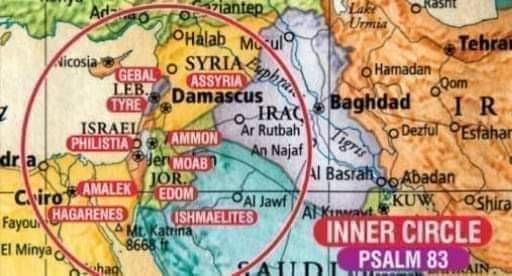
In The Days of Those [10] Middle Eastern Kings [Daniel 2:44 and Psalm 83:6-8]
by Paul MacDonald RN MA (Hons) Dipl
God's Kingdom Will Be Set Up During Days of the Future 10 Middle Eastern Kings
In the days of those (10 Middle Eastern) Kings [Daniel 2:44] God [Yahweh] will set up a Kingdom that will never ever be brought to ruin.
Middle Eastern Based Kings
These Kings, are not of a World Confederacy, but they are Middle Eastern Kings, and these Kings are described and named in (Psalm 83:6-8):
Edom, Ishmalite, Moab, Hashemite, Gebor, Amelek, Ammon, Philistia, Tyre and Assyria.
The Enemy Kings that Surround Israel
These are the very enemies that surround Israel and that will unify at some point to come upon it.
A Future Middle Eastern Union
These 10 Kings do not belong to any kind of Western Confederacy, but that of a Middle Eastern Union.
While there is a Gulf Union today, most of these are in conflict with each other, and we can see this especially where Iran and Saudi are concerned.
This Union doesn't exist as of yet, but what we see occurring in the Middle East now could be pathing the way for this very Union to come together.
The Coming West/Iran/Iraq War
But, before this Union does come together, there are a series of other events that must take place according to Daniel 11:5-20, 21-45., namely the West/East war between Greece and the Ram of the East (Modern day Iran).
The False 70 Weeks of Years Teaching
There is no "70 Weeks of years" with an interruption until 70th Week comes (at some unspecified future time), this is a false dispensationalist teaching, there is only a 490 day period before Great Tribulation begins.
The Pushing and Shoving Between Assyria and Egypt
In short, and as previously explained, there will pushing and shoving between the Kings of the North [Assyria] and of the South [Egypt].
This pushing and shoving will lead to a series of 8 bloody conflicts until the King of the North [the Assyrian] rises to be the most powerful and the most dominant in the region.
From this point onwards, these 10 Kings from this Middle Eastern Union will hand over their power to the Last King of Babylon (Revelation 17:12-13) and they will rule alongside him for the last hour (3.5 years)of mankind's history.
This will not only mark the beginning of the Time of the End, which is marked by the desecration of the Temple in Jerusalem [Daniel 11:23, 9:27 and Matthew 24:15).
The 3rd King of Assyria and of the World
When this last King of Babylon becomes King, it will not only be as King of his union, but that of the entire World [which he will trample under foot]. He does not rise alone as King and as a Kingdom, but he arises with that of 3 others which he will trample under foot, thus leaving him sole Ruler in all the Earth [Daniel 7:7].
The Assyrians Reign Will Be Short
While his rule will be short, and indeed very sweet [3.5 Years], he will come to his complete and utter end when the 70 years that have been decreed upon him come to their end (Jeremiah 25:12-13) and then Israel returns to the Land when Messiah Returns.
The Destruction of the Assyrian and Extension of Life Given to Other 3 Beasts it had Trodden Down
The 3 other Beasts however that he had trampled under foot, they will be granted an extension of life as they are absorbed into the Kingdom of God and that of his Christ’s [Daniel 7:11-12, Revelation 11:15]. This whole scenario with regards to rising of the Antichrist [the Assyrian] to ultimate power coincides with Satan's ousting from Heaven.
God's Kingdom Set Up
God’s [Yahweh’s] Kingdom is set up during the days of those 10 Kings [when there is an Arab Federation], and as I have said before, what we see happening now in the Middle East.
Other Nations Not Named in the Bible Outside Middle Eastern Nations
We don't know what other Nations will be doing because they are not mentioned, and they may not even exist, not in their present form anyway.
Russia, China, USA, UK and the European Union, they are not mentioned in the Bible, only the 10 Kings surrounding Israel. The whole World, at some point, will come under the King of Babylon’s/Assyria's [Antichrist’s] thumb.
Israel Will Be at the Mercy of the Rapidly Oncoming Assyrian and Egyptian Kingdom
With the West no longer ruling, Israel will be at mercy of Assyria and Egypt, and as prophesied in Lamentations, both Assyria and Egypt will have Israel by the scruff of the neck, until all that has been prophesied to occur has come to pass and the indignation finishes and the Day of Yahweh comes.
Paul MacDonald RN MA Dipl ©
Israel Institute of Biblical Studies

0 notes
Photo

Pour cette 3 soirée de l'Eurotournée avec Le @punchclub , on est à Bruxelles pour une belle rencontre avec @la_lip @me_morency - @florencelongpre - @suzie.bou Vs @ameleke - @valdellieu - Thomas Démarre Le quatrième et dernier show de la tournée aura lieu demain ( Samedi) à Londres avec les copains de la @fbimprovisation Mc: @robertnelson_president / @dedou3 Musique: @jshoule (à Le Fou Rire Théâtre) https://www.instagram.com/p/B5vUiPtIxoW/?igshid=1dqoitapsgheb
0 notes
Text
September 11, 2019
It’s hard to keep up daily. I’m getting farther and farther behind! But every day is filled with so much and I can’t believe I only have a week left.
Monday the grapevines we were suppose to harvest were not ready. The weather has turned a bit cooler, which we love, but the sugar levels drop in the grapes so the farmers have to wait a bit longer.
So we had the wonderful opportunity to go help a lady in her 70’s in the Judean desert near Jericho who has a farm of olive trees, pomegranates and dates. Some of the young men harvested the dates, but they were past their prime unfortunately because she doesn’t have enough help.
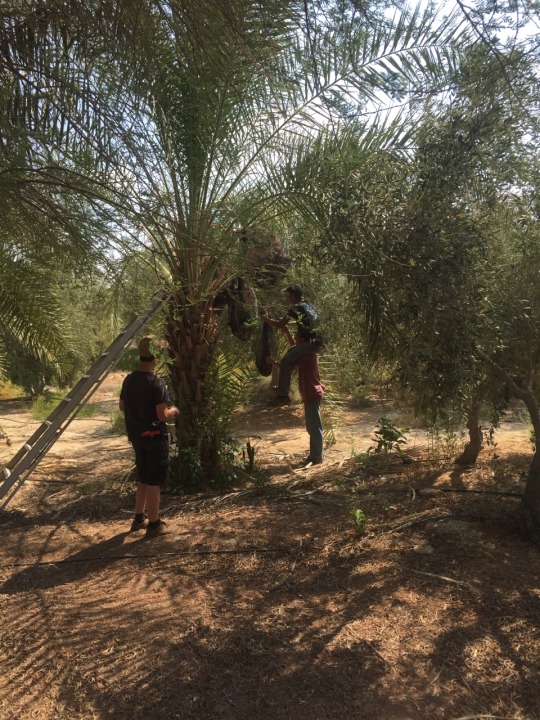
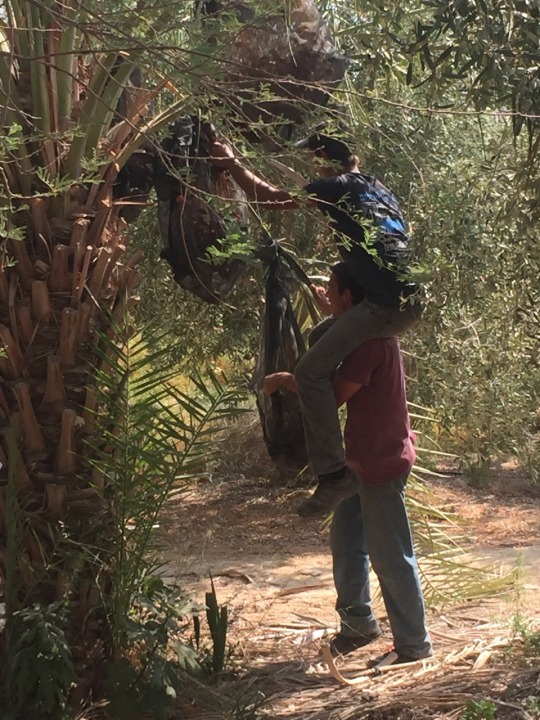
The rest of us harvested much of her olive trees, but did not have the time to do them all. It was fun to learn how to harvest olive trees. You use big long bamboo stick and little hand held rakes and you rake the branches and hit the trees so the olives will fall out. Before doing this we spread very huge tarps under the trees and then gather the olives with the tarps and put them in crates. Did you know you don’t eat olives off the trees? They have to be put in a brine that softens and makes them swell to be good to taste. And most of the olive oil comes from the seed when the olive is crushed.

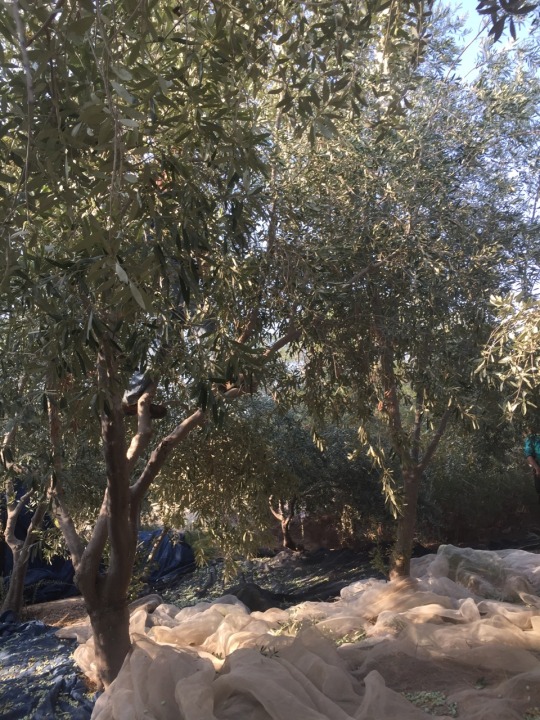

This lady had many stories... she is truly one of the very brave settlers that believes in living on the land God gave to her. Four years ago she and her husband were tied up by Arabs, and all of their belongings were stolen including their herd of goats. The Arabs were about to burn down their house when the IDF showed up. Unfortunately only one of the three men were caught and sent to jail. She is just one more Jew that is such an inspiration as she lives her faith and says she continues to do so because she sees God’s miracles all the time.
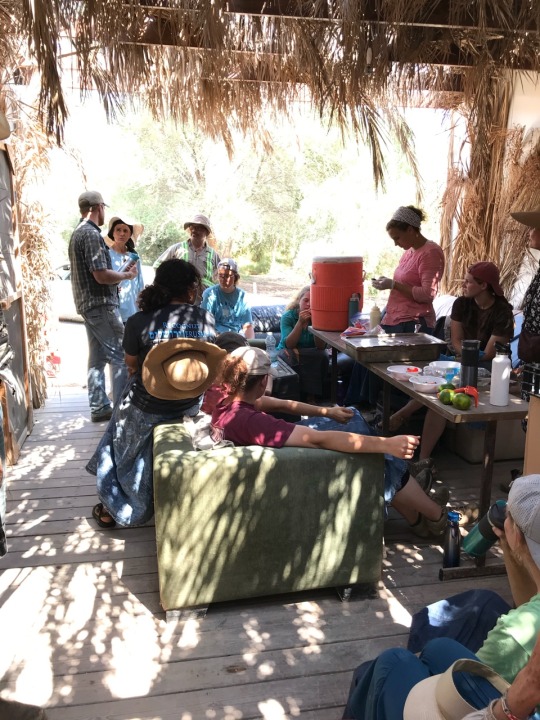
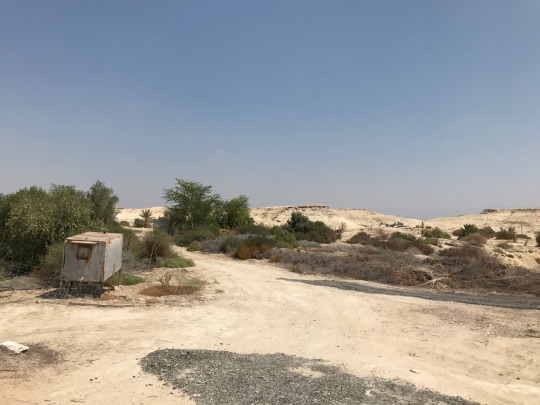
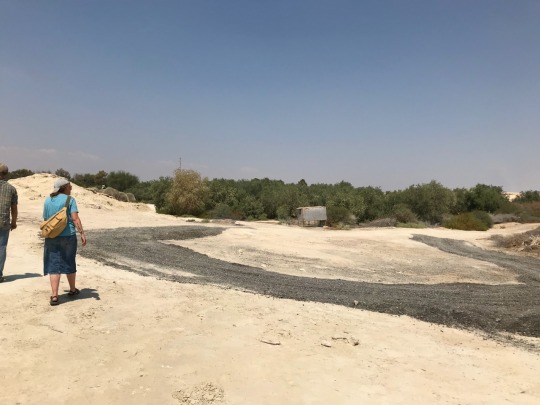
Here are some pictures of nearby homes built in caves.
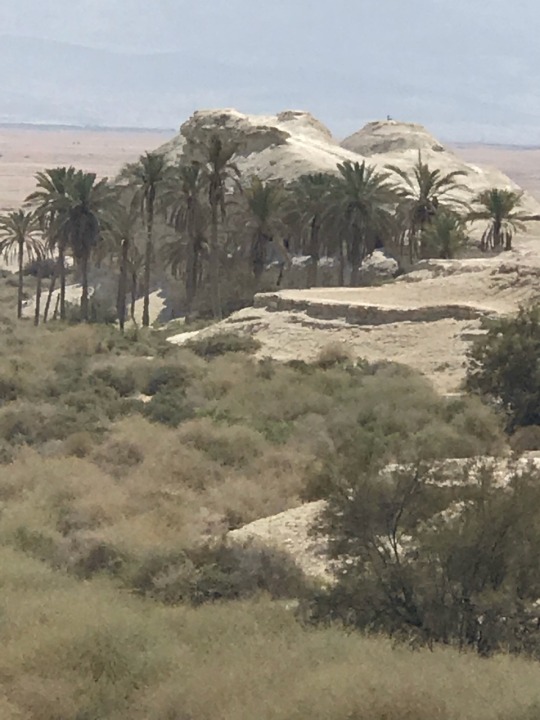
After going back to camp, Rabbi Jonadav came over from Har Bracha, and did a teaching on the upcoming Torah portion for Shabbat. He spoke about God’s instruction to Israel on how their relationships should be with certain people.
In Deut. 23:3-4 God tells Israel that the Ammonites and Moabites (they were descendants from Lot through his daughters) could never enter the assembly of Israel. Why? Because they did not bless Israel but cursed them. They did not greet them with bread and water when they left Egypt and hired Balaam to curse Israel.
As for the Edomites (descendants of Esau the brother of Jacob) God said they should not abhor them because he is their brother and also they should not abhor the Egyptians because they were strangers in their land. The children of the third generation could enter the assembly of Israel. (Deut. 23:7-8)
And in Deut. 25:17-19 God instructed Israel to blot out the remembrance of the Amelek from under heaven. Why? Because they did not fear God and they attacked the rear ranks, the weak and feeble, of the Israelites. God said do not forget to utterly destroyed them.
Jonadav explained that those who treat Israel poorly they should not have a relationship with them. The first thing of importance to a Jew towards others is not what they believe but do they bless the Jews. He said they believe in “tikkun olam”, which means they are to fix the world. So, they are optimistic the Christians are not trying to “save” them, because their experience in the past has meant if they would not convert the Christians were either persecuting or killing them. And they are optimistic the Moslems are not “lying” to them or trying to kill them. If all the nations just changed their mindset towards the Jews and blessed them instead of cursing them, what a difference it would make.
He also stated that Christianity has changed over the generations and has not reached a conclusion of their faith. The Jewish religion has not changed. God has always kept the Jews as a people. Below are some pictures of Har Bracha where Rabbi Jonadav lives.

In the evening after dinner Sandra Baras spoke to us. She also has an amazing organization that gives Christians an opportunity to help bless the Jewish people. Her organization is called Christian Friends of Israeli Communities (www.cfoic.com) if you wish to get on her mailing list and learn more about what she is doing and possibly have the desire to help Israel through her. Her organization and HaYovel are apparently the only two organization that are helping Christians have an opportunity to serve the Jewish people, and both are doing a great work! One of her main points was that we need to be “nudniks”, a Yiddish word meaning someone who keeps bugging others and pressuring them. We need to be nudniks for Israel, especially Judea and Samaria. She explained much history of Israel from 1948 on and the politics of the current day. Elections for Israel come up for the second time this year in less than a week.
Regarding the building of the temple which many are talking about, she said, people need to have a relationship with God and then desire the temple as a place for expression. In Jeremiah’s time they were a sinful people and thought they could just make it right with God by bringing on offering to the Temple. It doesn’t work that way!
She also said to read Deut. 30:1-10. The beginning of this redemption is happening now. She said, “don’t you want to get involved in what God is doing here in the land of Israel.” To that I reply, Yes!! I am so thankful to be here and be involved. There is nothing better!!
Tomorrow it’s off to Jerusalem!
0 notes
Text
Chicken Inn Launches Hot & Crispy chicken, Available on Pizarea
Chicken Inn Launches Hot & Crispy chicken, Available on Pizarea
Present were high Dignitaries like Henry Ameleke the CEO of Pizarea.com, Ameyaw Debrah, Cina Soul, Efya Odo and more to witness the launch of a new product by the chicken meal powerhouse Chicken Inn.
A company noted for brands like Pizza in, Creamy Inn and Chicken Inn delivering services in food varieties have decided to add a new product to their collection with the hashtag #Feelthecrunch.
The…
View On WordPress
0 notes
Text
Effects Of Mobile Money Interoperability On The Ghanaian Economy _- Henry Ameleke Writes
Effects Of Mobile Money Interoperability On The Ghanaian Economy _- Henry Ameleke Writes
On the 10th of May 2018, the government of Ghana together with the Ghana Interbank Payment and Settlement Systems Limited (GHIPSS) launched the mobile money interoperability system, which is meant to enhance Ghana’s financial system. The system is to allow the easy transfer of money across all mobile money platforms, without restrictions and facilitate the transfers of monies between bank…
View On WordPress
0 notes
Text
IPHONE AND APPLE USERS SMILE BECAUSE PIZAREA, NOW ON IOS!
IPHONE AND APPLE USERS SMILE BECAUSE PIZAREA, NOW ON IOS!
To all apple users, Pizarea says worry no more! Pizarea is currently on Apple Store free for downloads! We are excited we can finally serve all customers whether on android or on IOS. It has been a long time coming and finally we have launched the IOS Version of the Pizarea App.
We can guarantee that the IOS version has features that make it easier to use. There are no headaches involved in trying…
View On WordPress
0 notes